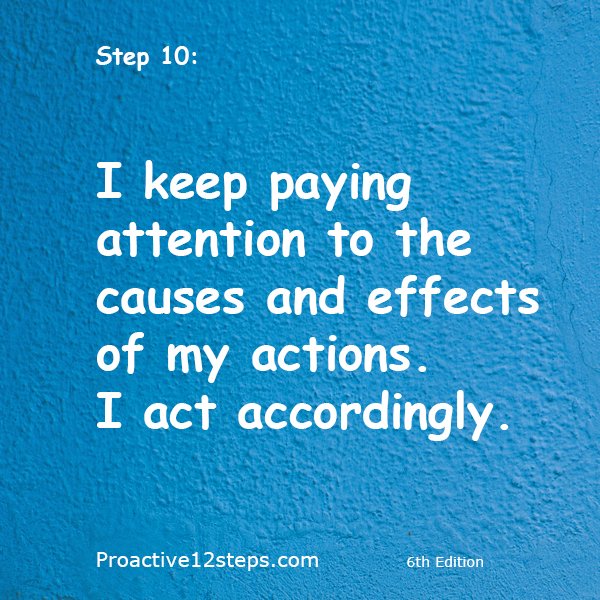
I keep paying attention to the causes and effects of my actions. I act accordingly.
Discussion of Step 10:
When you read that Step 10 is about continuing to pay attention to the causes and effects of your actions, you might feel that it’s a bit restrictive. Aren’t you already past that?
After going through steps 4 through 9, you could legitimately feel that you have turned a page. Indeed, you are much more aware of what it is that makes you do what you do. You have identified patterns. You have understood what is behind them. You have deeply understood how to change these patterns and apply these changes in real life.
Despite all of these achievements, Step 10 implies that you will misbehave if you stop paying attention. It’s good not to take things for granted, but there is a danger in being hypervigilant.
Living in fear of yourself
If you live in fear of your nature, you feel cramped. You fear that, at any time, you might do something terrible. So you have to always be on your guard.
Not only is it unpleasant to live with that sense of having to be constantly vigilant, but it’s also counterproductive. It adds to the pressure you are already feeling. You probably don’t need more of it in your life. Adding pressure keeps you in a hopeless loop, a vicious cycle: You keep pushing, pushing, pushing to improve, to be the best that you can be. As a result of pushing so hard, you are cracking under too much pressure. This cycle feeds itself.
What we are talking about in the Proactive 12 Steps is something very different. Instead of fostering a sense of distrust in your abilities, you acknowledge your accomplishments and build on them. You see how going through steps 4 through 9 has been helping you understand yourself more. You see that this has been helping you more of the person you want to be.
There is a sense of pleasure and liberation in being more aware of who you are and feeling able to change what you don’t like. There is a lot of satisfaction in being able to do this moment by moment. When you feel this way, the process of Step 10 is very pleasurable.
It is the opposite of feeling rigid control, living in constant fear that you will be doing something terrible. Instead, you are enjoying being conscious of your life. You are enjoying the mastery of being able to be who you want to be moment by moment.
Mindfulness as liberation
Ultimately, being mindful does not mean adding to your burdens. It is satisfying, as opposed to something that is imposed on you to cramp your style.
To use a practical example, let’s say that you intend to be mindful when you eat. You would like to notice and enjoy your food. Suppose you turn this into an internal critic that is constantly criticizing the way you eat. In that case, you turn this into a nightmarish experience.
It’s much better to see it as an opportunity. You say to yourself: “I might be more conscious of how I eat and of how I enjoy my food.” When you notice that you’re eating without any sense of satisfaction, you don’t criticize yourself and put pressure on yourself; you don’t force yourself to find joy. You just notice: “Gee, isn’t it strange how I don’t find satisfaction in eating?”
Noticing gives you an occasion for pausing and wondering. You might then ask yourself: “Was there a moment when I enjoyed even a small part of this experience?”
It may very well be that all you want is to have your belly full; you do not take any pleasure in the moment-by-moment experience of eating. The point is not to force yourself to experience something you are not experiencing. It is to start a dialogue with yourself. You begin to understand better what happens. Little by little, you give yourself a chance to find something that works for you. It’s not a pre-imposed thing. It’s not a mold that you have to fit into, or else.
Engaging your curiosity
The same goes for paying attention to the causes and effects of your actions. It is possible that, at this point, the process of mindful awareness described in Steps 4 through 9 does not give you much of a sense of pleasure. You might see it as cramping your style. You might be longing for the possibility of not having to pay any attention. If this is the case, it’s good to notice it. And then, it’s not a question of then forcing yourself to pay attention or trying to avoid it altogether. Instead, it is an opportunity to be curious about what makes you uncomfortable with this process. Very gently. You’re not trying to shoehorn in a new habit. You’re trying to understand better what it is that makes it uncomfortable for you. Little by little, as you know it, you have a higher possibility to change it.
The idea is that you consider that it might be possible for you to be happy and satisfied when you’re more mindful of your life. You don’t force yourself to be aware. But you explore how the way you pay attention makes you unhappy, or cramped, or impatient, or somewhat flooded. As you stay with it, new opportunities open up for you. You come to understand that the goal is not to cut off parts of you for you to become something that corresponds to some abstract idea of good. You have a growing sense that this is a process of liberation and expansion.